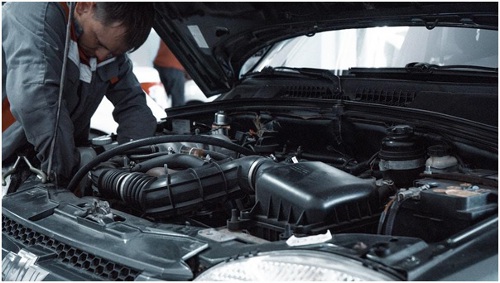Do you need an extended vehicle warranty? It’s a question that many vehicle owners grapple with when considering the purchase of additional coverage for their vehicles. While the decision ultimately depends on various factors, it’s worth understanding the benefits and drawbacks of extended warranties. This article will review some of the considerations for purchasing an extended warranty. Keep reading to learn more about the process of finding the best auto warranty suitable for your needs.
Understanding Extended Auto Warranties
An auto warranty, also known as a vehicle service contract, is an essential investment that provides extensive coverage for auto repairs and related expenses after the expiration of the original factory warranty. While auto insurance primarily covers accidents and liability, an extended warranty focuses on mechanical failures, ensuring you’re financially protected from unexpected repair costs.
This form of warranty can be acquired from car dealerships or third-party providers at any time before your manufacturer warranty expires. However, third-party providers usually offer more comprehensive policies. By choosing to invest in an extended warranty, you’re essentially securing peace of mind by knowing you’re protected against potential mechanical breakdowns that may occur in the future.
Extended warranties usually widen the range of covered repairs and services beyond the scope of the original manufacturer’s warranty. This often includes repair of the engine, drivetrain, transmission, and electrical system components. The cost of this longer-term peace of mind can vary depending on factors like the age, make, model, and condition of your vehicle.
Thinking About the Need for an Extended Warranty


Manufacturer warranties are designed to provide coverage for a specified period or mileage, depending on which comes first. These warranties offer a sense of security for vehicle owners, knowing that any defects or issues during this time will be repaired by the manufacturer without any cost. However, once this period elapses, the responsibility for repair costs falls on the shoulders of the owner.
For individuals with high-end vehicles or models that are known for having expensive components, the cost of out-of-pocket repairs can quickly add up to more than the cost of an extended warranty. This is because luxury vehicles often incorporate advanced technologies and specialized parts that command higher prices. By opting for an extended warranty, owners can safeguard themselves against these potentially hefty repair bills and ensure their vehicle remains in optimal condition even after the warranty period ends.
No matter what kind of vehicle you drive, however, most modern cars are now highly complex machines brimming with high-tech electronics. While these technological advancements have undoubtedly made driving safer, more comfortable, and more enjoyable, they also bring about a new set of challenges when it comes to maintenance and repairs. If something goes wrong, it can be costly to repair. An extended warranty can offset these potential costs in the long run.
Extended warranties are not only about providing coverage and protection for unexpected repairs and breakdowns; they can also offer additional benefits that make owning a car a hassle-free experience. Extended warranty plans can provide ancillary benefits, such as rental car coverage, towing, and roadside assistance. All of these considerations are worth thinking about as you determine whether an extended auto warranty is right for you.
Considering the Cost of Extended Auto Warranties


When considering the cost of an extended auto warranty, there are several factors that can influence the price you may have to pay. The make and model of your vehicle is one such factor, as different cars may have varying levels of complexity and higher repair costs. Luxury or high-end vehicles may require more expensive parts and labor, which can drive up the price of the warranty. On the other hand, less expensive or more common models may have more affordable warranties.
The age of your vehicle also plays a role in determining the cost of an extended warranty. Older vehicles generally have a higher risk of experiencing mechanical breakdowns, and as a result, they may require more comprehensive coverage. As a result, the premiums for warranties on older cars are typically higher.
The level of coverage you desire can also greatly impact the cost of the warranty. Basic plans may only cover essential components such as the engine and transmission, while more comprehensive plans may provide coverage for a wider range of parts and systems. Naturally, the more comprehensive the coverage, the more expensive the warranty will be.
It’s worth noting that while an extended auto warranty can provide peace of mind and financial protection against unexpected repairs, it’s crucial to research and compare different plans to find the best coverage at the most reasonable cost for your specific needs and monthly budget.
The Fine Print


When it comes to purchasing an extended warranty for your vehicle, it’s paramount to take a closer look at the fine print to ensure you have a solid understanding of the terms and conditions. While an extended warranty can offer peace of mind and provide protection for your car, it’s essential to ensure it actually covers any issues that may arise. Rushing through the process without understanding what’s covered, what is not, and any applicable deductibles could lead to disappointment and frustration later on.
By carefully reviewing the coverage details of the extended warranty, you can make an informed decision. Look for specifics about what components or parts are covered, as well as any conditions or limitations that may apply. For example, certain types of damage or wear and tear may not be covered, or claims may be denied if they’re deemed to be a result of misuse or negligence. Additionally, oil changes and other regular maintenance items are usually not covered. By carefully examining the fine print, you can have a clear understanding of what scenarios are covered and what are not, enabling you to make an informed decision about whether the extended warranty is worth purchasing for your needs.
Weighing the Choice
When considering whether to invest in an extended warranty for your vehicle, there are several factors to take into account. First and foremost, your driving habits play a crucial role. If you rack up a high mileage each year or are particularly hard on your vehicle, an extended warranty may provide added protection and peace of mind. On the other hand, if you only use your vehicle for short commutes and occasional weekend trips, the likelihood of encountering major repairs may be lower, making an extended warranty less necessary.
The dependency on your vehicle is another important consideration. If you heavily rely on your car for work, family, or other crucial commitments, unexpected breakdowns or repairs can severely disrupt your daily life. In this case, investing in an extended warranty can provide a safety net, ensuring you won’t be left stranded and facing hefty repair bills.
The reliability of your vehicle plays a significant role as well. If you own a make and model known for its outstanding durability and low maintenance costs, an extended warranty may be less essential. However, if your car has a history of frequent repairs or is prone to certain mechanical issues, an extended warranty can safeguard you from significant out-of-pocket expenses.
Ultimately, the decision to get an extended warranty depends on your peace of mind and financial comfort. If the idea of unexpected repair costs keeps you up at night, an extended warranty can provide the security and reassurance you need. Conversely, if you have enough savings or are comfortable taking on the risk of potential repairs, forgoing an extended warranty might be a more viable option.
Overall, the decision to purchase an extended auto warranty comes down to your specific situation and vehicle. However, an extended vehicle warranty can be a valuable investment that provides peace of mind by protecting you from unexpected and costly repairs. With coverage for major components and additional benefits like roadside assistance, having this warranty ensures you can drive with confidence, knowing you’re protected against the financial strain that comes with unexpected vehicle repairs.


























